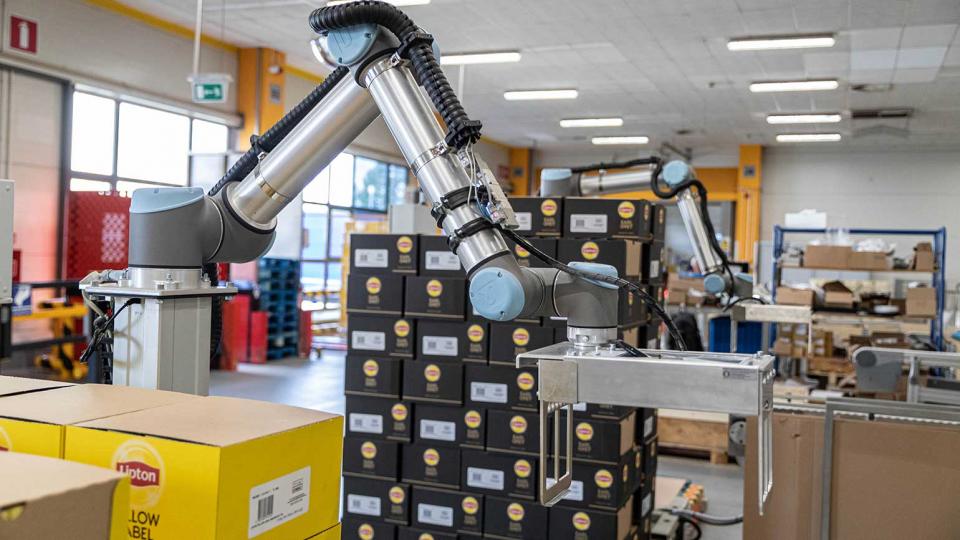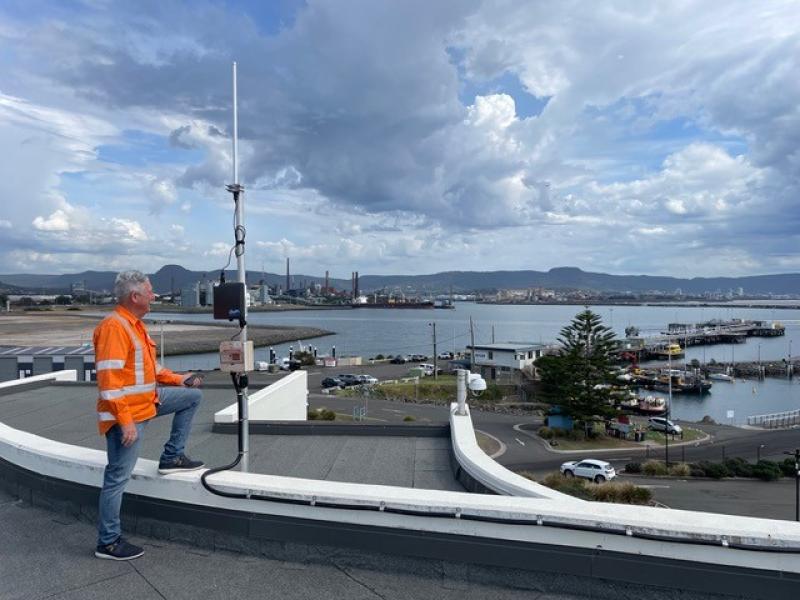As one of the leading players in the FMCG sector, Unilever owns more than 400 brands and can be found in 180 countries. 2.5 billion people make use of Unilever’s products each day and the company requires constant production precision to meet global consumer demands.
The company turned to Universal Robots to relieve its employees from strenuous palletising tasks at its production plant in Katowice, Poland.
As one of four production plants in Poland, the Unilever plant in Katowice specialises in the packing of tea. In the past, employees would manually pack 25-kg sacks of tea into ready-to-sell cartons.
The Challenge
The plant employs around 400 people across two production halls. Darius Ratajczak, Automation Senior Specialist at Unilever says that for a long time, the company had faced challenges in finding and retaining employees to perform monotonous, manual, and strenuous tasks related to palletising and packaging.
It had also become harder to find employees who were up for this strenuous job. As Darius explains, “each year, a decreasing number of people would apply for positions related to palletising. This part of the process is central to our operations and has to be performed efficiently.”
Unilever looked to an automated solution to combat its challenges but initially struggled to find a flexible robot with the appropriate payload and reach. In addition, it required a robot that could be easily programmed with intuitive handling.
It’s Teatime
Taking both the pros and cons into consideration, Unilever opted for collaborative robots (cobots) over palletising robots.
According to Dawid Mroczek, Automation Specialist at Unilever, the company considered various options but finally decided on the UR10 from Universal Robots.
With a reach of 1300mm and a payload of 10kg, the UR10 met the requirements to pack tea with the help of a vacuum gripper.
“Unilever needed a solution that was easy to deploy, flexible and would deliver a quicker return on investment all whilst improving its productivity,” explains Darrell Adams, Head of Southeast Asia Oceania for Universal Robots.
Based on the success of implementation, the company deployed six UR10 cobots at its plant in Katowice. “Six UR10 cobots pack and place ready-to-sell cartons on pallets. In the past, employees spent 70% of their time packaging and 30% palletising, but thanks to the cobots, 30% of their time was freed up to focus on valuable and strategic tasks” he continues.
Intuitive and Effective
The UR10 palletises around 1100 boxes during an eight-hour shift at Unilever. Each box is placed on a pallet in a predefined pattern.
The cobots’ programming depends on the shape and size of cardboard packaging. However, in all cases this process is similar. After reaching the specified number of boxes on the pallet, the UR10 starts the next layer.
The pallet usually contains six to ten layers and 10 to 21 boxes in each layer. When the packaging process on one layer is completed, the cobot calculates the new height and marks the starting point for the next one. When the operator notices that the UR10 begins to stack cartons on the next pallet, he departs with the already loaded pallet. It takes around 20 to 30 minutes for a pallet to be completed.
Dawid notes that the on-boarding process of its first cobot took around three weeks but since then, they can be deployed in just a few hours. “The basic training for our automation team was provided by a distributor of Universal Robots in the region.”
“My first experience in robot programming was achieved through the UR Academy website. In our team, we exchange experiences and systematically increase the complexity of the functions used with more advanced scripting programming” Dawid continues.
“Programming at the basic level is extremely intuitive. Currently, we use mainly advanced scripting programming, because it allows us to speed up and unify the creation of programs which is achieved by defining ramps and sizes of boxes in the program.”
Success
The most labour intensive activities at the plant have been eliminated, productivity has increased, and employees have been relieved of strenuous tasks.
Thanks to this success of this project, Unilever is considering the further implementation of cobots at other plants.
Cobots Uptake Locally
“Much like Poland, Universal Robots in Australia and New Zealand is too supported by a knowledgeable local team and a well-represented distributor network, and we look forward to rolling out similar projects on our ‘local shores’,” says Darrell.
Palletising is just one of the many applications in a factory that can be handled by cobots. According to Darrell, Universal Robots has seen an increase in the demand from local manufacturers for applications which place ergonomic strain on employees and require the performance of repetitive tasks which can lead to injury.
“Often cobots do the jobs that humans don’t want to do - dull, boring and strenuous jobs. Not only are cobots experts at repeating the same movement over and over - they also do it with exact accuracy which leads to higher quality output” he explains.
Cobots free up workers to do more meaningful tasks upstream and downstream in the production line.
“Support is always on-hand. The Universal Robots Academy offers an array of free resources and trainings for users of all levels - from in-class to online training, webinars and video tutorials” Darrell concludes.






